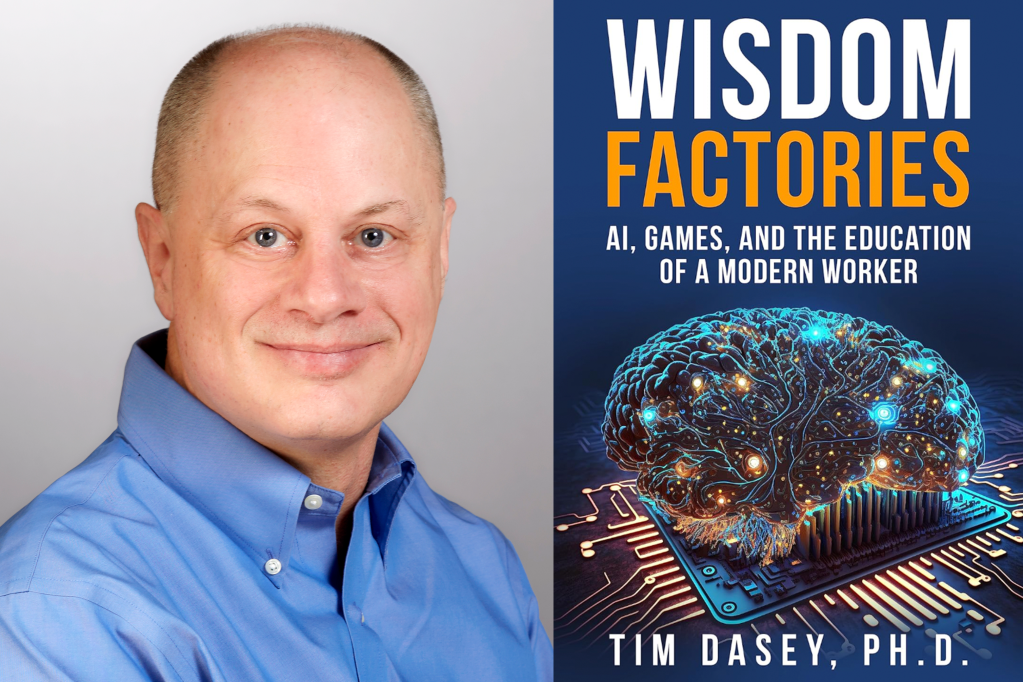Towards the end of 2001: A Space Odyssey, computer HAL 9000 takes control away from the humans who command him. “This mission is too important for me to allow you to jeopardize it. I know that you were planning to disconnect me, and that’s something I cannot allow to happen,” HAL says, exercising his newfound consciousness.
Although 55 years old, the film’s central theme is more relevant than ever. It encapsulates humans’ worst fears about AI, that in time collective machine intelligence, sometimes known as the singularity, will take over from humans. What happens next is a frightening unknown.
That outcome, if at all possible, is a way off yet. A more immediate concern is how AI will be integrated into the workplace and how it will interact with humans.
Employing wisdom
Tim Dasey examines this multitude of challenges in Wisdom Factories: AI, Games, and the Education of a Modern Worker. He starts with a historical overview of how humans have dealt with new technologies and of how education systems have evolved in response. That moves from the Luddite movement of the Industrial Revolution, to the 1983 publication of A Nation at Risk: The Imperative for Educational Reform, a treatise on the failures of modern schooling, to the modern day.
“The wisdom skills espoused by the 21st Century skill philosophies … need to be the central objectives, or we risk competing with AI instead of collaborating with it. We will lose that contest.”
Tim Dasey, author
He advocates for wisdom over expertise, because the former encompasses central concepts that will be key to keeping humans relevant in the AI era. “The wisdom skills espoused by the 21st Century skill philosophies … need to be the central objectives, or we risk competing with AI instead of collaborating with it. We will lose that contest,” Dasey says.
What this means is nurturing skills that may be borne of experience rather than rote learning, employing the right (wisdom-oriented) side of the brain together with the left (detail-oriented), and reforming education systems accordingly. This means a move away from a focus on siloed and ultimately repetitive tasks to “big picture thinking”, a rather outdated and hackneyed buzzterm that could now see a resurgence.
In this way, and possibly only in this way, the positive aspects of AI could be harnessed, allowing humans to work in tandem with machines at the highest level. Human efforts would then be focussed on mentoring, managing, leading, and strategizing. One of the pitfalls of the current educational landscape, Dasey says, is that these skills have less value in a results-driven workplace since they aren’t quantifiable and can’t be measured with KPIs.
Another major error being made is how older workers are perceived and valued. Research from 2018 shows that 56% of employees in their 50s and in a stable job were pushed out against their will. The choice to retire is taken by the employer, not the employee. Older workers are considered slower, but have the wisdom gained from decades of experience. “Older workers are treated like squeezed lemons, with little left but the rind.”
Playing games
Dasey’s proposed remedy is the use of gamification to improve workers’ and students’ skills. Games, play, and simulations don’t just bring fun back into learning, they provide a better way of teaching abstract concepts. An overemphasis on “working hard” in school years to soak up a large amount of information, much of which will be forgotten, has led to despondency and had the opposite effect of that intended.
“The typical problems with experiential learning are that it happens slowly and requires the opportunity to have relevant and varied experiences. Play created experiences that people may never naturally get.”
Tim Dasey, author
Businesses and societies must change alongside education, Dasey points out. Mindsets must change. The view that AI would compliment and not replace human thinking skills has fast become outdated. AI will replace humans in many tasks, and the advent of ChatGPT has for many accelerated this line of thinking.
Is this just history repeating itself, or a new dawn for humanity? Some have theorised that humans will no longer generate economic value in the way they have in the past. There are concerns about how this would play out. Would governments introduce a universal basic income? Speaking recently at the Bletchley Park AI Summit, Elon Musk, often viewed as something of an AI era prophet, repeated the thinking of many business leaders that computers will take on the dangerous and tedious jobs. “We won’t have a universal basic income, we’ll have a universal high income,” Musk said with confidence.
There aren’t yet structures in place for this and there is no Plan B in the event of AI-induced mass unemployment. Books like Dasey’s are important if only for taking on the key points of a conversation that very much needs to happen, and sooner rather than later.
Hear more from Tim Dasey on the GRIP podcast.













